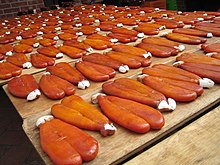Karasumi
Appearance

Karasumi (Japanese: カラスミ (唐墨,鱲子), Romaji: karasumi; Chinese: 烏魚子; pinyin: wūyúzi; Pe̍h-ōe-jī: o͘-hî-chí) is a food product made by salting mullet roe and drying it by the sunlight. A theory suggests that it got its name from its resemblance to a block of sumi (inkstick) imported from China (Kara) and used in shodo[citation needed]. Karasumi is a high priced delicacy and it is eaten while drinking sake.
It is a speciality of Nagasaki and along with salt-pickled sea urchin roe and Konowata one of the three chinmi of Japan. The town of Tungkang in Taiwan specializes in the delicacy.
